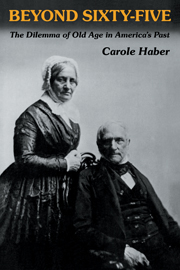Book contents
- Frontmatter
- Contents
- List of Tables
- Acknowledgments
- INTRODUCTION: Classifying Society's Superannuated
- CHAPTER ONE Aging in Colonial America
- CHAPTER TWO Social Realities and Perceptions of Old Age in the Nineteenth Century
- CHAPTER THREE Medical Models of Growing Old
- CHAPTER FOUR Treating the Postclimacteric Stage
- CHAPTER FIVE Institutionalizing the Elderly
- CHAPTER SIX The Pension Barrier
- CONCLUSION: Old Age in a Bureaucratic Society
- Notes
- A Note on Secondary Sources
- Index
CHAPTER TWO - Social Realities and Perceptions of Old Age in the Nineteenth Century
Published online by Cambridge University Press: 26 February 2010
- Frontmatter
- Contents
- List of Tables
- Acknowledgments
- INTRODUCTION: Classifying Society's Superannuated
- CHAPTER ONE Aging in Colonial America
- CHAPTER TWO Social Realities and Perceptions of Old Age in the Nineteenth Century
- CHAPTER THREE Medical Models of Growing Old
- CHAPTER FOUR Treating the Postclimacteric Stage
- CHAPTER FIVE Institutionalizing the Elderly
- CHAPTER SIX The Pension Barrier
- CONCLUSION: Old Age in a Bureaucratic Society
- Notes
- A Note on Secondary Sources
- Index
Summary
In the early republic, the presence of large numbers of the povertystricken could easily be explained. Their existence was part of God's plan; the Bible had stated it clearly: The poor will always be with you. The American experience offered ample evidence of this scriptural wisdom. Even in a land of vast opportunities, some individuals would never prosper. The sick, the crippled, the insane, and the aged formed a seemingly permanent class, destined by misfortune and disease to depend on the benevolence of others. To the almshouse manager or the supervisor of outdoor relief, there seemed little reason to question the legitimacy of the elderly's need or to institute a policy that might isolate them from other destitute persons. According to the philosophy of charity popular in the early nineteenth century, such victims of circumstance, age, and misfortune were all simply part of the worthy poor, valid recipients of compassion and relief.
As the century progressed, however, this perception of the elderly would be altered significantly. In time, the old would be distinguished from other groups, separated by their advanced age and seemingly helpless condition. By virtue of their sheer number and destitution, the aged poor came to be categorized as a serious and growing welfare problem. This widespread belief, as we shall see, sprang from two not unrelated phenomena. In large part, it was based on changing social and economic conditions faced by a sizable proportion of the elderly. Especially in the nation's largest cities, the old found their traditional means of retaining prestige eroding.
- Type
- Chapter
- Information
- Beyond Sixty-FiveThe Dilemma of Old Age in America's Past, pp. 28 - 46Publisher: Cambridge University PressPrint publication year: 1983

